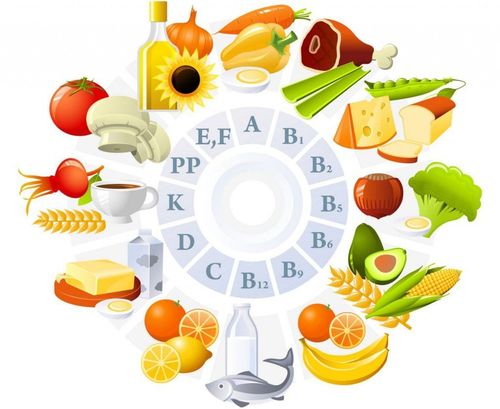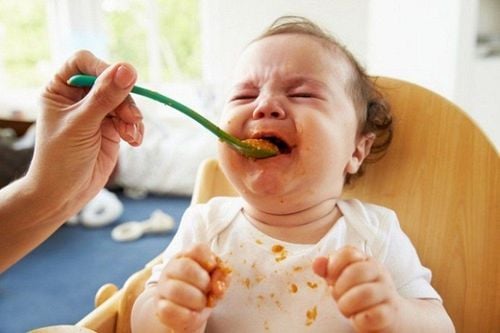This is an automatically translated article.
The eating habits of 4-year-old children have almost changed a lot compared to the previous period. To overcome the situation of 4-year-old anorexic, parents need to understand the psychology and eating preferences of children, thereby helping children integrate into meals with the family.
1. What is anorexia in children?
Anorexia or anorexia is considered a condition in which children refuse to eat or are not interested in eating or eat too slowly, have no appetite... This condition is manifested by many different causes and It can also be medical or psychological.
2. Causes of 4-year-old anorexia
4-year-old children anorexia, slow weight gain can be caused by the following common causes:
4-year-old children anorexia due to psychophysiology: This condition can appear when parents are too worried about their children's eating. children and force them to overeat or even yell at them. Therefore, when it comes to meals, it can become a child's obsession and gradually form a lazy eating habit. Some children who are sick or have just recovered from the disease have not had time to eat again, but being forced to eat by adults also makes children feel afraid to eat. In some cases, especially children who have not yet adapted to the new environment, such as changing schools or changing caregivers, but forcing them to eat too much, it can cause children to inhibit the secretion of digestive enzymes, leading to severe diarrhea. 4-year-old children do not gain weight due to anorexia. 4-year-old child anorexia due to pathology: Children may have anorexia right from the womb. When pregnant mothers may not pay attention to the diet, eat less or lose their appetite, causing the fetus to be deficient in micronutrients such as iron, calcium, zinc and vitamins. From these causes, the children suffered from fetal malnutrition, forming an anorexic habit after birth. In addition, children with acute diseases such as bacterial infections, viral infections of the respiratory system, digestive system.. easily cause a loss of micronutrients in the body, thereby making children lazy to eat with a condition. intestinal dysbacteriosis, abdominal distension and indigestion. However, anorexia caused by an illness is usually temporary and the child will return to eating when he/she recovers from the illness or is properly cared for by parents. In addition, the nutrition in the child's diet is not suitable, which also makes the child anorexic. For example, if a child is given solid food by parents too early compared to the recommendation or the child's diet is not balanced, the food preparation is not suitable for the child's preferences, creating a habit of eating and playing, causing the child to eat and play. children do not focus on meals, give them snacks and drink too many soft drinks before the main meal...

Bé 4 tuổi biếng ăn có thể do tâm sinh lý gây ra
3. Signs of 4-year-old children not gaining weight due to anorexia
Some of the signs that a 4-year-old child is not gaining weight or a 4-year-old child is slow to gain weight are as follows:
The child eats less than usual The child only eats a few foods and it is difficult to introduce new foods to them. children get used to the child's meal time lasts more than 30 minutes or even longer, The child feels nauseous or vomiting when smelling the food.
4. Some ways to overcome the situation of 4-year-old children anorexia
The important thing in taking care of anorexia children, parents need to remember to encourage children to eat, not force them to eat or put pressure on children during meals. In any case, parents should not force their children to eat, otherwise it will hurt the child, and may even affect the child's intellectual development.
To help children eat well, parents should apply some of the following methods:
Always be patient with the child to eliminate the causes of the child's anorexia. Especially for children with pathological anorexia, parents need to monitor the child's health status, and at the same time take the child to see a doctor to find out suitable remedies. During the time the child is being treated for illness, especially for diseases related to inflammation and infection, parents need to fully supplement essential vitamins for the child, such as vitamin A, vitamin B, vitamin C and important minerals. such as zinc, calcium, iron, magnesium, selenium... Parents should not overuse antibiotics unnecessarily, because they can cause resistance or even have serious effects. more on children's health. Children's meals should prepare a variety of dishes and help children get used to different foods to stimulate the taste buds. Parents should also regularly change their children's menus to help children get excited about their meals and have an appetite when eating. Children at this age, although not growing as fast as the first years of life, but each year their weight can increase by about 2 kg and the average height in a year is about 7cm. Therefore, the nutrition of children at this age should be ensured. Moreover, at this stage, children begin to complete the digestive system and need to be provided with enough energy and nutrients to help the body metabolize and grow. The average recommended energy requirement for a 4-year-old child is about 1470 kcal/day. The nutritional source is supplemented with enough protein, carbohydrates, fats, vitamins and minerals. Children should eat three main meals and two snacks each day. Protein requirements account for about 36 grams. In addition, children should still drink about 500ml of milk a day.

Cha mẹ nên chế biến đa dạng món ăn giúp khắc phục tình trạng bé 4 tuổi biếng ăn
Besides creating reasonable meals for children, parents should also pay attention to choosing safe food to prepare food for children. These foods need to have a clear origin. Children should be given cooked food and boiled water, and especially not using stale food or giving food that has been left overnight.
Parents practice for children the habit of joining meals with family members. During the meal, it is necessary to create a happy and comfortable atmosphere to help children have a delicious and excited meal. Children's meal times should be made at a fixed time frame. Depending on the age of the child as well as the nutritional needs to be provided to the child, parents can balance the number of meals as well as the amount of food for the child so that it is most appropriate. Help children get used to the circadian rhythm of eating and sleeping at the right time. During the eating process of children, parents especially pay attention not to let children use electronic devices or use any form of negotiation or coercion for children to eat. In addition, for children with anorexia, parents can add products containing zinc, selenium, chromium, vitamins B1 and B6, ginger, acerola fruit extract (vitamin C),... to improve taste. , eat well, reach the correct height and weight, and exceed the standard, have a good immune system, strengthen the resistance to get sick less often and have less digestive problems.
The improvement of symptoms can take place for a long time, so it is recommended that parents be calm and persistent when supplementing with nutrients for children, even through eating or functional foods. In particular, the use of functional foods should choose those of natural origin that are easily absorbed, do not allow simultaneous use of many types or continuously change the types of functional foods.
Please regularly visit Vinmec.com website and update useful information to take care of your baby and family.













